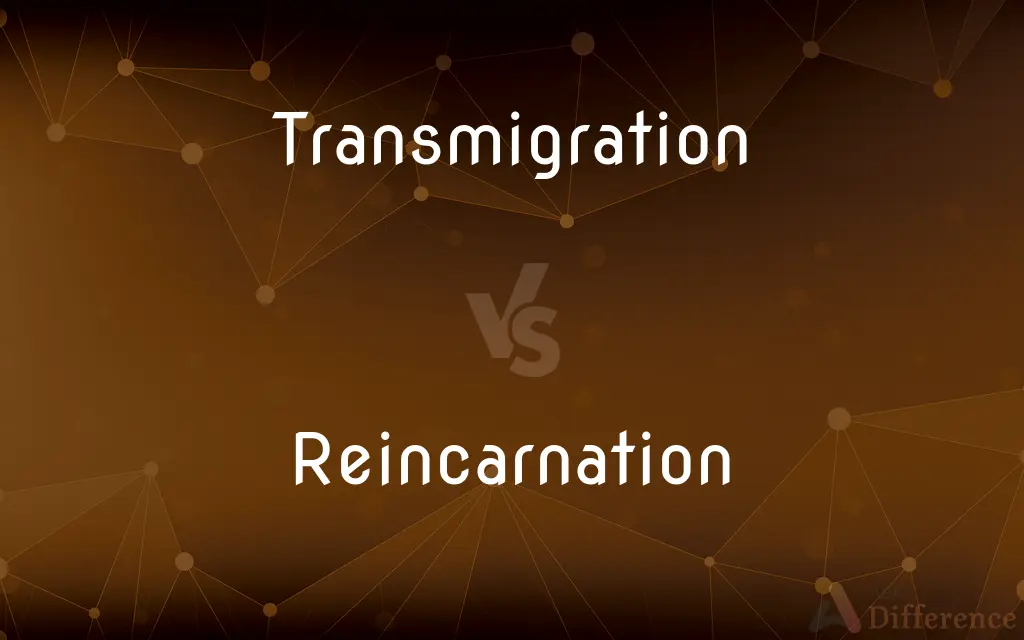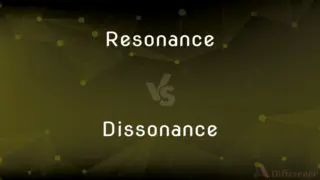Transmigration vs. Reincarnation — What's the Difference?
By Fiza Rafique & Maham Liaqat — Updated on March 18, 2024
Transmigration refers to the soul's passage after death into another body, without specifying the form, while reincarnation emphasizes the soul's rebirth into a new human life, focusing on continuity of identity.

Difference Between Transmigration and Reincarnation
Table of Contents
ADVERTISEMENT
Key Differences
Transmigration is a concept that encompasses the soul's journey after death, moving into another body or form, which could be human, animal, or even plant, depending on various beliefs. Reincarnation, on the other hand, specifically involves the soul's rebirth into a new human body, often with the implication of a continuous identity or karma from past lives influencing the new life.
While transmigration suggests a more general and wide-ranging process that can lead to a variety of existences across different forms of life, reincarnation is typically associated with a more focused path of spiritual development or moral progression within the human realm. This distinction highlights the scope and direction of the soul's journey in each belief system.
In many traditions, transmigration is seen as part of a cycle that is influenced by the actions and moral decisions of the soul in its various lives, potentially leading to a wide array of experiences in different forms. Reincarnation, whereas, is often viewed within the context of achieving enlightenment or liberation, with each human rebirth providing a new opportunity for spiritual growth and advancement.
The concept of transmigration can be found in various religious and philosophical traditions, offering a broad perspective on the afterlife and the soul's evolution. Reincarnation, on the other hand, is more closely associated with specific religions like Hinduism and Buddhism, which provide detailed frameworks for understanding the process and its implications for human life.
Transmigration allows for a more fluid understanding of life and existence, suggesting that the soul's journey can traverse different realms and forms of life. Reincarnation emphasizes the importance of human life and experiences, suggesting a focused path toward spiritual realization and liberation.
ADVERTISEMENT
Comparison Chart
Definition
The soul's journey after death into another body or form.
The soul's rebirth into a new human body.
Forms
Can be human, animal, plant, or other forms.
Primarily human forms.
Focus
Broad range of experiences and forms.
Continuity of identity and moral progression.
Associated Beliefs
Various religious and philosophical traditions.
Primarily Hinduism and Buddhism.
Goal
Can vary widely, often involves experiencing different forms of life.
Often focused on spiritual growth, enlightenment, or liberation.
Compare with Definitions
Transmigration
The movement of a soul after death into another body or form.
The ancient belief in transmigration suggested a soul could next inhabit an animal form.
Reincarnation
The rebirth of a soul in a new human body.
Reincarnation is a key concept in Hinduism, where the soul undergoes many human births.
Transmigration
A broad concept of soul journey across various existences.
Transmigration encompasses the idea that one could be reborn as a plant, animal, or human.
Reincarnation
The continuation of the soul's journey specifically through human lives.
Reincarnation emphasizes the unique opportunities for growth available in human life.
Transmigration
The transition of the soul that transcends human boundaries.
In transmigration, a soul could transition into entities beyond human comprehension.
Reincarnation
The belief in a spiritual journey focused on human enlightenment.
Through reincarnation, the soul progresses toward higher states of awareness.
Transmigration
A cycle of rebirths encompassing all living entities.
The doctrine of transmigration opens the possibility of being reborn in a completely different ecosystem.
Reincarnation
The cycle of death and rebirth within human existence.
Reincarnation suggests that the soul retains a core identity through various human lifetimes.
Transmigration
The passage from one state of existence to another.
Transmigration allows for the soul's evolution through diverse life forms.
Reincarnation
A process where past lives influence the current one.
In reincarnation, unresolved karma from past lives can shape one's current experiences.
Transmigration
To migrate.
Reincarnation
Reincarnation, also known as rebirth or transmigration, is the philosophical or religious concept that the non-physical essence of a living being begins a new life in a different physical form or body after biological death. Resurrection is a similar process hypothesized by some religions, in which a soul comes back to life in the same body.
Transmigration
To pass into another body after death. Used of the soul.
Reincarnation
Rebirth of the soul in another human or nonhuman body.
Transmigration
Departure from one's homeland to live in another country; migration.
Reincarnation
A reappearance or revitalization in another form; a new embodiment
"The brownstone had already endured one reincarnation.
Transmigration
A change from one state of existence to another.
Reincarnation
A rebirth of a soul, in a physical life form, such as a body.
Transmigration
The movement of a soul from one body to another after death; metempsychosis.
Reincarnation
The philosophy of such a rebirth, a specific belief or doctrine on how such a rebirth occurs.
Transmigration
The act of passing from one country to another; migration.
Reincarnation
A fresh embodiment.
Transmigration
The passing of the soul at death into another mortal body; metempsychosis.
Reincarnation
A new, considerably improved, version.
Transmigration
The passing of a soul into another body after death
Reincarnation
Embodiment in a new form (especially the reappearance or a person in another form);
His reincarnation as a lion
Reincarnation
A second or new birth
Reincarnation
The Hindu or Buddhist doctrine that person may be reborn successively into one of five classes of living beings (god or human or animal or hungry ghost or denizen of hell) depending on the person's own actions
Common Curiosities
Is reincarnation always about human rebirth?
Reincarnation primarily focuses on the soul's rebirth into human forms, emphasizing continuity and spiritual progression.
Can transmigration lead to non-human forms?
Yes, transmigration encompasses the possibility of the soul inhabiting non-human forms, such as animals or plants.
Do all religions believe in transmigration or reincarnation?
No, these concepts are specific to certain religious and philosophical traditions and are not universally accepted across all religions.
Is the goal of reincarnation always enlightenment?
While not always explicitly stated, many traditions with a belief in reincarnation view it as a path toward spiritual enlightenment or liberation.
How do reincarnation and transmigration explain the concept of karma?
Both concepts often incorporate karma, suggesting that the actions in past lives influence the conditions of future rebirths.
Can individuals remember their past lives in both beliefs?
Some traditions suggest that memories from past lives can surface, especially in reincarnation, where the focus is on human experiences and spiritual lessons.
What is the key difference between transmigration and reincarnation?
Transmigration refers to the soul's movement into various forms after death, while reincarnation specifically involves rebirth into a new human life.
How do beliefs in transmigration and reincarnation affect moral behavior?
Both beliefs suggest that actions and moral decisions in one life can influence the conditions of the next, encouraging ethical conduct.
Can transmigration end, or is it an eternal cycle?
In some beliefs, the cycle of transmigration can end when the soul achieves a certain state of realization or purity, similar to the goal in reincarnation.
How does reincarnation differ in Hinduism and Buddhism?
While both religions share the concept, Hinduism emphasizes the soul (atman) and its journey, whereas Buddhism focuses on the continuity of consciousness without a permanent self.
How do transmigration and reincarnation view the concept of the soul?
Transmigration may involve a more flexible view of the soul's journey, while reincarnation often posits a more continuous and individual soul identity.
Can the belief in reincarnation affect social and cultural practices?
Yes, cultural practices, such as funeral rites and ancestor veneration, can be deeply influenced by beliefs in reincarnation and the soul's journey.
Are there any scientific evidences supporting transmigration or reincarnation?
Scientific evidence for these concepts is lacking, and they remain matters of faith and personal belief.
Can the belief in transmigration influence environmental and animal rights views?
Yes, the belief that one could be reborn as an animal or plant can lead to a greater respect for all forms of life and the environment.
Is there a final goal in the cycle of reincarnation?
Many traditions see the final goal as moksha or nirvana, representing liberation from the cycle of rebirth and ultimate spiritual enlightenment.
Share Your Discovery

Previous Comparison
Resonance vs. Dissonance
Next Comparison
Principal vs. AdministratorAuthor Spotlight
Written by
Fiza RafiqueFiza Rafique is a skilled content writer at AskDifference.com, where she meticulously refines and enhances written pieces. Drawing from her vast editorial expertise, Fiza ensures clarity, accuracy, and precision in every article. Passionate about language, she continually seeks to elevate the quality of content for readers worldwide.
Co-written by
Maham Liaqat














































